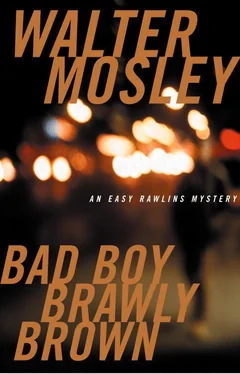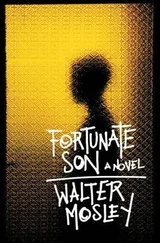“Dead? Why dead?”
“Because the only reason a lotta mothahfuckahs out there didn’t come after you was because’a Raymond,” Sam said. “They hated you but they were more scared of Mouse. Some’a the peoples come in my place called you all kindsa dog, but they knew better than to even say sumpin’ to you. Shit. Easy Rawlins got a guardian angel from hell, that’s what they said.”
Part of the reason Sam was riding me was that he was jealous of my friendship with Mouse — everybody was. Raymond Alexander was the most perfect human being a black man could imagine. He was a lover and a killer and one of the best storytellers you ever heard. He wasn’t afraid of white people in general or the police in particular. Women who went to church every week would skip out on Sunday school to take off their clean white panties for him.
And I was his only friend. I was the one he called first. I was the only one who could tell him no. If Mouse was going to kill a man, I was that poor soul’s last court of appeal.
But that wasn’t all that was eating Sam. He was a talker, a thinker, a man who read the newspaper every day — but Sam was not a man of action. He stayed behind his door-board and stared down the bad men who came into his place. In his restaurant he was the king. But on the street he was just another guy, a frightened black man in a world where being black put you below the lowest rung of white society.
There were no black men in tuxedos playing the violin at the symphony or elected to the Senate or at the heads of corporations. There were no black men on the board of directors or representing our interests in Africa, and very few cruising up and down Central Avenue in police cars. Black men, as a rule, were not scientists or doctors or professors in college. There was not even one black philosopher in all the history of the world, as reported by our universities, libraries, and newspapers.
If you wanted to be an important black man, you had to take a risk and go your own way. You had to challenge a man who outnumbered you ten to one. And every one of that ten was armed with the latest weapons while all you had was a slingshot. That’s why David was such a famous biblical character in the black community, because, against all odds, he brought down the giant.
That’s what Sam Houston dreamt of doing, standing tall and making a difference. He saw himself as an important, intelligent man but he was afraid, with good reason, to stand out from the herd and be heard.
“Well, you know, Sam,” I said, “I been through some pretty hard times without Raymond at my side. I mean, I made it through a whole world war and five years in L.A. when he was still down in Texas. And then there was that five years he did for manslaughter. Naw, man. Those people talkin’ to you have had their chance before now.”
It wasn’t the words but the tone in my voice that kept Sam from one of his snappy replies.
“What you want from Clarissa?” he asked.
“Whatever it is she knows and I don’t.”
That wrinkled look took over Sam’s face, and I knew that he was thinking again.
“What?” I asked him.
“This is what you used to do? Run around sniffin’ after what somebody might know? Drivin’ all over hell?”
“Before I settled down to a job,” I said. “Yeah.”
“But somebody like John cain’t pay you. I mean, John cain’t hardly cover the price for the materials he usin’ to build them houses.”
“That’s true,” I said. “Sometimes I’d be out there findin’ somebody’s missin’ wife when all I was gettin’ out of it was a free tune-up for my car. But every now and then I’d open some door and somebody’d be on the other side offerin’ a thousand dollars just to close it again.”
“That’s crazy,” Sam decreed.
“Yeah, you better believe it. More than that,” I said. “ Crazy ain’t even the word.”
Sam brought me to a small house in Riverside, on a street called Del Sol. The lawn was unruly and the bushes that grew around the walls had become ragged. From the design of the house, I was sure that it was built by the people who had first lived in it. Arc-shaped and multileveled, it was two stories to the right of the entrance and only one to the left. When Clarissa opened the front door she fell back and I could see that there was another door behind her. The glass in that door revealed a green backyard. It was a home with its own personality. I broke out a cigarette to accent my pleasure at the unique design.
“What are you doing here?” she asked. “Doris called but she just said that you were comin’, Sam.”
“It’s okay,” Sam said. “I know you been lyin’ to me, but Easy here done broke it down. I brought him to find out about Brawly, but he ain’t gonna do nuthin’ to hurt either one’a you.”
Clarissa’s shoulders slumped and she led us into the living room, which was in the two-story part of the house. The room had been straightened up recently. I could tell that the once pristine white carpet had seen a spate of stains and cigarette holes, but all of that had been vacuumed and cleaned to show its best face. The rosewood furniture was old and well cared for, except at one time the spilled glasses had been set upon the surfaces with no coasters and the cigarettes that fell to the floor first were set on the corners, where they left bullet-shaped black smudges along the edge.
Everything that could be reached was dusted, but there were cobwebs along the ceiling and thick dust at the top of the drapes.
Clarissa was wearing blue jeans and a white T-shirt with no bra underneath. She was a good-looking girl. Her skin was dark and her light eyes large and translucent. If I had to guess her thoughts, I would have said that she was hoping that she could close her eyes and when she opened them we would be gone.
“Sit down, Clare,” Sam said.
She did as she was told.
The fluffy tan sofa and chairs had been vacuumed also. The suction hole had left neat lines across each fabric surface. I took to a chair while Sam sat down next to his cousin on the couch.
“Mr. Rawlins has some questions to ask you,” Sam said.
“I ain’t talkin’ to him,” she said.
“Why not?” A sharp tone came into Sam’s voice.
“’Cause I ain’t,” she declared, and I was reminded of Juice.
“They killed Henry Strong,” I said. “You know that, right?” Clarissa looked up at me with hatred in her eyes.
“I didn’t do it, sugar,” I told her. “But whoever did is still out there.”
“What’s that got to do with me an’ Brawly?”
“The first one killed was his father,” I said. “Somebody beat him to death at Isolda Moore’s house.”
For an instant the bright-eyed girl froze.
“Isolda Moore,” I repeated. “She’s Brawly’s cousin, used to live up here. You know her, don’t you, Clarissa?”
“Bitch,” she uttered.
“What kinda language is that?” Sam said.
“Let her use any language she need to, Sam,” I said. “Is this her house?” I then asked Clarissa.
“No.”
“Then it must be BobbiAnne’s,” I said. “BobbiAnne Terrell’s house. What is it, the parents dead? Moved away for good? They can’t just be on vacation, not with the mess this place was in before you cleaned it up.”
Clarissa was stunned by my simple deductions. Sam was, too.
“How you know all that?” he said.
“Did they bring the guns out here?” I asked Clarissa.
She shook her head.
“What guns?” Sam wanted to know.
“How long was Conrad livin’ out here?” I asked.
Clarissa started to cry.
“I didn’t tell you,” she sobbed. “I wouldn’t.”
“Of course you wouldn’t,” I said in a soothing tone. “You’d never betray your man. But you kids are in it deep. It doesn’t matter that he thinks he’s invisible, that he believe the cops and the government don’t know what he’s doin’. He thinks they don’t even know he’s out there, but he’s in plain sight, like a sittin’ duck, like a fish in a barrel, like—”
Читать дальше












